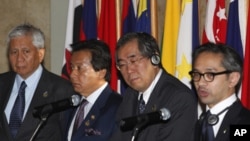Southeast Asian nations will not discuss maritime border disputes when they meet later this year with their key dialogue partners, unless there are further clashes in disputed territory. Burma’s government also told regional foreign ministers that it is open to dialogue with opposition parties.
Foreign ministers of the Association of Southeast Asian Nations Monday said they will address political and security issues when they meet later this year with partners in the East Asia Summit.
But Indonesian Foreign Minister Marty Natalegawa says one of the most contentious issues raised last year, the South China Sea, is off the agenda.
China lays claim to most of the sea, including areas that Taiwan and ASEAN members Brunei, Malaysia, the Philippines, and Vietnam also claim.
China and Vietnam have fought over tiny islands in the disputed territory and Beijing’s navy has been increasingly assertive in the area, believed to be rich in oil and near critical sea lanes.
At the close of the ASEAN foreign ministers meeting Monday, Natalegawa said some maritime issues will be discussed at the summit, but South China Sea dispute will stay off the table unless there were renewed clashes.
"Whether that maritime issues include South China Sea depends on where we are when the leaders meet," he said. "Hopefully, things are very quiet and very stable and therefore there is no need to bring the issue to the East Asia Summit."
The East Asia Summit brings together the 10 ASEAN nations, plus Australia, China, India, Japan, New Zealand, and South Korea.
At ASEAN meetings last year, United States Secretary of State Hillary Clinton said the peaceful resolution of the South China Sea disputes is also in Washington’s interest, sparking a harsh response from China.
Russia and the United States attended the summit as observers last year but this year will be full participants.
Some ASEAN nations are want to make sure their agenda dominates the East Asia Summit, and that it not be pushed aside by the concerns of ASEAN’s powerful dialogue partners.
Natalegawa says ASEAN foreign ministers agreed Monday one way to do that would be to only discuss issues which they had a common position on or that were current events and could not be ignored.
They also discussed Burma’s development of democracy after a nominally civilian government in March replaced the military one.
He says Burma’s foreign minister, Wunna Maung Lwin, told the meeting it was leaving the door open to communicate with “all elements” in the country, including democracy leader Aung San Suu Kyi.
"I had spoken on a number of occasions, not as ASEAN chair but as Indonesia, with Daw Aung San Suu Kyi, on a number of occasions," said Natalegawa. "I know she is looking forward to having these communications with the new government in [Burma]. So, we would like to see if the new government is also of that view, then this communication ought to be taking place in real and not just in intentions."
Natalegawa also said the ASEAN ministers also discussed a deadly border dispute in February between Cambodia and Thailand when their militaries exchanged artillery and machine gun fire, killing several people on both sides.
Indonesia, as ASEAN chair, brokered an agreement to send observers to the disputed area to monitor an informal ceasefire.
But Natalegawa said Monday the deployment of observers has been delayed by disagreement over which areas they should be allowed to monitor.




